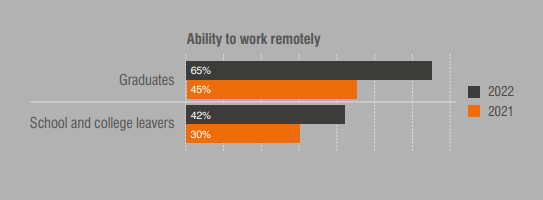ISE’s Development Survey shows how employers perceive the skills graduates and school leavers are equipped with and how their needs have changed, explains researcher Nicola Thomas.
Developing the skills and attributes of new hires when they join an organisation is key for those particularly early on in their careers.
ISE’s Development Survey 2022 highlights the Covid effect on graduate and school leaver skills – both in terms of what employers want and what they percive young people already have.
The pandemic changed what employers want
Our findings showed that one in three employers reported that they had changed their skill requirements as a result of the pandemic.
There also seemed to be a larger consensus around what skills are needed by graduate hires this year compared to last.
Employers were more focused on hiring graduates based on ‘soft’ skills this year. Namely, attitudes such as resilience, adoptability, self-motivation, and confidence were reported as more important by employers in a post pandemic workplace.
Some employers told us that there has been a shift in some of the skills needed for graduates and school and college leavers as a result of Covid-19. Specifically, an employer in the energy sector told us that “We require more digital skills, with more of an emphasis on resilience/growth mindset and self-motivation”.
Drop in business-appropriate communication
We can see that while there is some consistency across the skills that school and college leavers and graduates possess already (for example interpersonal skills, digital skills and listening), the weakest areas have shifted over the last three years.
Across the board, employers rated skills such as business-appropriate communication as being weaker in 2022.
This is unsurprising given the lack of opportunity for work experience during the pandemic. Coupled with a shift to virtual learning at most universities, graduates have had less opportunity to develop work specific ‘soft skills’, such as communication, than they had in previous years.
The issue is particularly prevalent among school and college leavers as in 2022 business-appropriate communication rose to the weakest skill, while it was 4th and 8th weakest in 2021 and 2020 respectively.
This makes sense considering that the shift to virtual working and studying has impacted school and college leavers particularly. Throughout the pandemic communication skills have been identified as at risk for this group. This is because increasingly communication is turning virtual through microsoft teams, slack and online messaging, so school and college leavers do not have the opportunity to practice business-appropriate communication.
Working remotely is in demand
This year we found the the ‘ability to work remotely’ is a skill that is in high demand. Compared to prepandemic times, jobs frequently require student hires to work in a hybrid way, meaning increasing demand for the ability to work collaboratively online.
One employer told us, “More skills are required in working remotely and independently. We need them to explicitly ask for help when remote working. Also, in hybrid working they need to develop different ways of networking”.
This theme of more skills needed for remote work was repeated across several employers across many different sectors, emphasising that student hires need more “adaptability and flexibility to work hybrid and virtually”, and a “greater ability to drive their own development”.
That said, employers painted an optimistc picture of this skill in 2022. For example, this year more graduates and school and college leavers had the ability to work remotely at the point of hire, with 65% of graduates having this skill in 2022 compared to only 45% in 2021.

Employers expect less from graduates
Managing up has been identified as the first or second weakest skill for graduates across the last three years. This shows a high level of consistency and highlights an important skill area to develop in graduate development programs.
However, we did see a strong trend in the 2022 survey which indicated that employers typically expect less from their graduate hires this year.
This speaks to a sector-wide awareness of the limited opportunities graduates have had for skill development during the pandemic. It’s also an encouraging sign that employers have a realistic view of what abilities they can expect from their recent early career hires in 2022.
Overall, we can see that there has been a shift in the skills that are needed from employers due to the Covid-19 pandemic. This is in part due to changing business needs, like the need for student hires to work remotely. On the other hand, part of the change has been due to the changes in skill development due to an online learning experience, like the lack of opportunity to practice in person communication techniques.


0 Comments